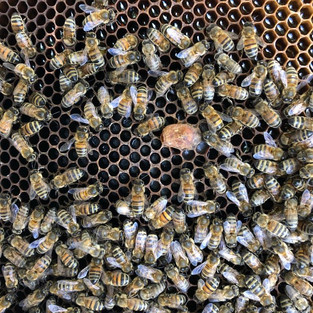KATJA TAUSIG - BEEKEEPER
- Jun 18, 2020
- 3 min read
Updated: Nov 6, 2020
I have always been interested in bees. Working as a chef I am aware how dependent our food chain is on these lovely little pollinators. A few years ago I inherited some beekeeping equipment from my mum’s cousin. He kept bees in Highgate cemetery, and his honey was branded with a drawing of Karl Marx who is buried there. I decided to take a beekeeping course to see if I could put his equipment back to use.

WHO DID YOU LEARN FROM, AND HOW? WHAT’S YOUR RELATIONSHIP LIKE WITH THEM, AND HOW DID IT COME ABOUT?
My foundation knowledge came from the course I did with the North London Beekeepers, but soon after I completed the course I met Tim Cowen who was selling honey at my local farmers market. He only sells once or twice a year so it is very lucky that we crossed paths. I told him I was keen to start beekeeping, and he said he happened to have a hive to sell. I waited 5 months until the winter came, and then went to collect the bees. Tim helped me move them to my garden and has been helping me ever since!
There is so much to learn about beekeeping and so many different approaches.
I learn something every time I go in to the hive, and having a bee buddy there with me is invaluable. Another influence has been Eric Beaumont, who sells honey every other week at the same farmers market. I have started to help him out every now and then running the stall in return for bees, honey and advice.
HOW DO THE SEASONS AFFECT YOUR PRACTICE, AND DAY TO DAY, NOT JUST IN BEEKEEPING, BUT IN YOUR OWN ROUTINES AND WORK TOO?
The seasons have had a huge effect on my life since I have started beekeeping. Last year, for example, I wanted to take a break from working in restaurants and go travelling. The time I had to do this was limited to a three month window when the bees were over-wintering. During this time (November-January) the bees are hivebound, and put all their energy into maintaining the temperature inside the hive. It is important not to open the hive during this time, as a shock of cold could hamper the colony’s chance of surviving the winter. Despite this it is important to check that they have enough honey stores to see them through, which is done by lifting or ‘hefting’ the hive to assess the weight. So whilst I was away Tim made two visits to my bees to heft the hives and feed if necessary. So now that I am committed to keeping bees, the seasons and the bees will dictate when I am allowed to go on holiday, which feels quite nice!
Another thing to note about the seasons is how much more in tune you are when you keep bees. Blossoms in January are now a signal that the bees will soon emerge from the hives. Trees and blossoms in bloom make me think of the nectar flow; first Plum, then cherry, sycamore, dandelion, borage, limes and so on, I start to get anxious if it hasn’t rained.
The seasons also punctuate my work and spare time, as I love to go on walks and pick things here and there if they are growing in abundance. This flow of wild food is just as exciting to me; alexanders are one of the first things to poke their head in late winter, the young leaves can be used as a delicious aromatic herb, and are a promise of more tasty treats around the corner; wild garlic, elderflowers, honeysuckle, berries and most excitingly mushrooms! As the seasons change I have these treats to look forward to.













Comments